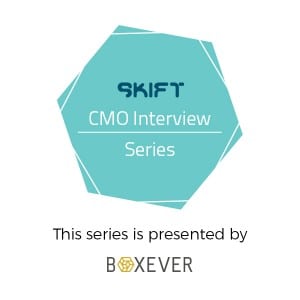Skift Take
Despegar has entered a new chapter in Latin America as the site eliminated phone bookings in favor of online bookings only. The company is undergoing major changes and is rethinking how it balances its online and offline marketing.
Editor’s Note: Following our previous CEO interview series in online travel, hospitality, and destinations, Skift has launched a new series, this time focused on Chief Marketing Officers.
To better understand the big marketing challenges facing travel brands in an age when consumers are in control, Skift’s What Keeps CMOs Up at Night will talk with the leading voices in global marketing from across all the industry’s sectors.
These interviews with leaders of hotels, airlines, tourism boards, digital players, agents, tour operators and more will explore both shared and unique challenges they are facing, where they get insights, and how they best leverage digital insights to make smarter decisions.
This is the latest interview in the series.
Despegar was founded as an online travel agency in 1999, but it took nearly 15 years for the company to resemble a booking site. Until two years ago, most of its bookings came from over the phone — including many landlines.
The company has phased out phone bookings over the past two years as online bookings scale faster than call-center bookings. Albeit, customers can still call Despegar’s call centers with questions about bookings. The Latin American market is mobile savvy, yet online travel booking is still a novelty throughout much of the region. In parts of Brazil, Despegar’s largest market, many airline tickets are still delivered via couriers to travelers’ homes, for example. That, along with Brazil’s economic woes, have forced the site to emphasize language and assets touting the affordability of travel.
Despegar does this through TV commercials and its YouTube channel, where it informs travelers in Spanish and Portuguese that they can “pay in installments” and find that “offers are cheap” while showing which banks are accepted for payment. Watch one of these videos (in Spanish) below this interview.
The Argentina-based online travel site is one of the largest in Latin America and operates in nine markets including Brazil, Colombia, Argentina, and the U.S. It sells hotel rooms, airline tickets, car rentals, vacation rentals, cruises and vacation packages. Despegar also has a powerful ally in Expedia, Inc., which took a minority stake in the site’s parent, Decolar, last year. Expedia invested $270 million in Decolar and took a 16.36 percent stake in the company.
Andres Patetta, head of online marketing for Despegar, said Expedia’s investment is helpful for learning about new travel marketing trends but doesn’t dictate the kind of marketing his team can do.
“I look at Expedia’s marketing performance as much as I look at Priceline’s marketing performance,” Patetta told Skift.
“The fact that Expedia has a minority stake in our company doesn’t have anything to do with the kind of marketing that we do. Those companies are incredibly big so I have to be aware of what they’re doing just because they may be doing something that we are not. Expedia’s stake has only given us a little bit more proximity and probably some experience and sharing so we both may learn something from each other.”
Skift spoke with Patetta to understand how the company has brought its business entirely online and how that’s influencing its consumer marketing in Latin America in 2016 and beyond.
Skift: A couple years ago, most of your bookings actually came from over the phone. How has that changed and influenced your marketing?
Andres Patetta: We no longer sell travel over the phone. Every sale we do is on our website, 100 percent. The phone used to be a very strong channel for us but that hasn’t been the case during the past year to year and a half. Phone doesn’t scale-up as our site does and conversion rates transitioned to being higher on our site than over the phone.
The idea of having online bookings responds to a corporate strategy, not to a cost-cutting reason. It is proven that machines and technology carry fewer mistakes or errors when it comes to registering bookings. For this reason, Despegar.com has invested a lot to have an effective online booking system that will provide more safety to its customers. Results are better and customer satisfaction has improved since we implemented this strategy.
With our campaigns to prospect new clients, these are the tough ones because you’re entering at the research phase. That’s much more expensive for us to do than the price comparison phase or decision-making phase. So we used to help on the decision-making process with the phone, but once we switched off the phone as a booking channel we had to move that to the site. That was an important shift for us in terms of our perspective on the online purchase process.
Skift: So now that everything is online, how has marketing changed with your app, for example?
Patetta: Mobile platforms are very immature in terms of how marketing works there. We’re doing a lot of marketing to drive interactions among app users. The reason for that is we don’t like to acquire downloads of our app just for the fact of having a lot of downloads. We don’t see the point of that. We like to think that every app download is because there’s a genuine interest behind it on the user side.
From the marketing front, the challenge is being present but not being invasive. You have to show the user that our app is pretty cool and that they’re two clicks away from having it on their phones. But we can only do that with users who we think would value the app. We do this because we know that the repeat rate for conversions for an online travel booker is not as high as an online retail shopper. It’s hard to think that every traveler needs to have our app downloaded every day of the year. It’s not the same as having the Amazon app on your phone, for instance. We try to be present in the right moment.
Skift: Brazil is your largest market, and right now that country has a lot of problems with its politics and economy. It’s preparing to host the 2016 Summer Olympics, one of the largest global events, in a few months as it’s marred by scandal. Have you seen any impact to bookings from this market? How are you managing the message with your Brazilian customers about booking travel?
Patetta: I’d be lying if I told you that the social and macroeconomic situation in Brazil isn’t having any impact on the market for us. It definitely is. Brazil’s GDP dropped four points last year and the first half of 2016 doesn’t look any nicer. Retail markets have shrunk 30 percent year-over-year. Travel hasn’t shrunk as much in Brazil but it’s also not growing. Whenever a crisis occurs and the market shrinks, the more efficient companies arise with more market share.
And we know a lot about that because we’ve run through a lot of different crises in pretty much every country we operate in. Colombia, Argentina, Mexico, etc. This isn’t the first crisis we’re facing. We’re still confident that this is going to be a very good year for travel in Brazil. With this summer’s Olympics, occupancy levels in Rio and nearby cities are going to be incredibly high. We feel like we’re already top-of-mind for many of the customers who will be booking hotels for the games.
Skift: Besides current events, what’s one of the biggest ongoing challenges you’re facing?
Patetta: The mobile channel is a new world, but it’s just a communication channel between your brand and the user. It has its pros and cons compared to desktop websites but without a doubt the big pro with mobile is that you can be with your user at every moment that they need you. With mobile you have a direct line of communication between the user and your company.
But is that something that the user wants? That is a very important part of mobile. You want to have strong communication with the users who want that.
I’d also say that one of our biggest challenges is trying to identify the same user across different platforms. Since we’re oriented to very personalized content, trying to match whether you’re the same user on your smartphone or on a desktop site, that’s very difficult.
Skift: As opposed to challenges, what was your biggest marketing success in 2015?
Patetta: Last year we achieved a pretty good balance between online and offline media in terms of measuring efficiency and understanding the impact that we have on users. If you speak to other companies outside of travel, you may hear that they’re very good at either offline or online marketing. Some may even be good at both.
But whenever you start asking questions about whether you’ll spend the next $10 on offline or online media, you will find that they don’t even measure both kinds of media in the same way. Or that they base their decisions on hunches. I’m very proud in what we’re doing to measure efficiency regardless of the channel. We came up with homemade algorithms and models to help us with what we think is the best way to invest in marketing.
Skift: What else is new with your marketing campaigns?
Patetta: We have a wide variety of marketing campaigns and you can say we have mainly two types of campaigns. We have the direct response and performance-oriented campaigns where we try to get new customers and then brand awareness campaigns where we’re generating awareness among our existing customers and those travelers who have booked with us before. For the direct response, we’re very into performance in Google search, Facebook, TV, radio, newspapers, etc. We’re extremely heavy investors on performance in every media that we buy.
And then with the brand awareness campaigns, our focus there is to be top-of-mind in every market where we are. We really rely on TV and then online video like our YouTube channel to do this.
This series is presented by Boxever. The Skift content team maintains complete editorial control over these interviews and the selection of subjects.
For more insights from Boxever, please see the following reports:
The Daily Newsletter
Our daily coverage of the global travel industry. Written by editors and analysts from across Skift’s brands.
Have a confidential tip for Skift? Get in touch
Tags: cmo series, despegar, latin america
Photo credit: Andres Patetta, Despegar's head of online marketing. Despegar

